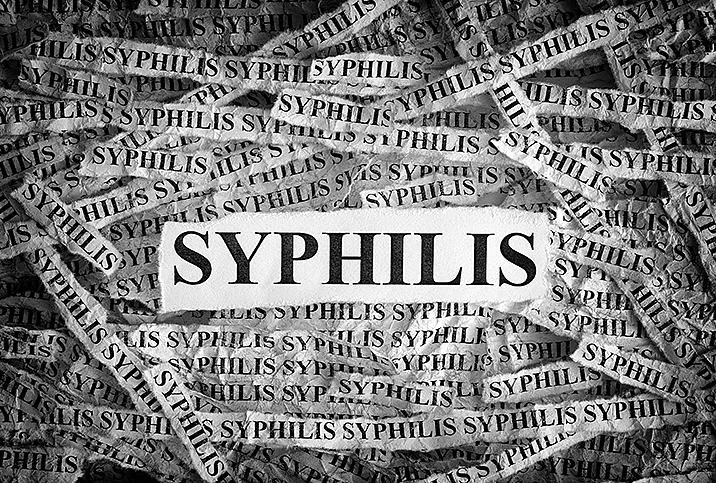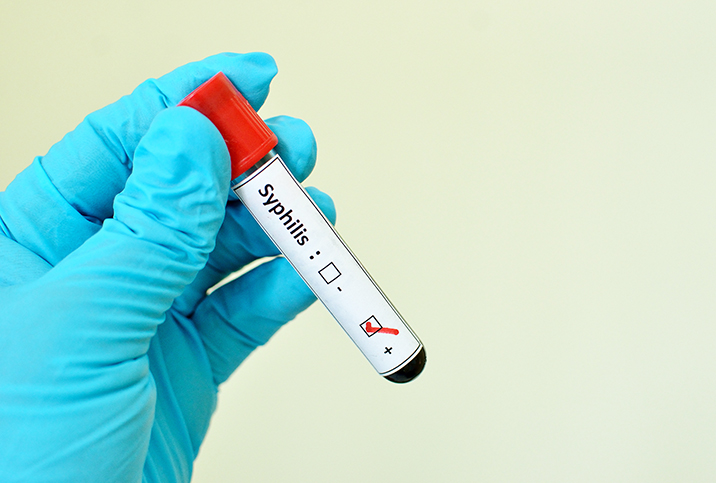The Effects of Syphilis on Pregnancy

Syphilis, a once-prevalent sexually transmitted disease (STD), was thought to have been near eradication—but this cannot be further from the truth. This highly damaging infection is on the rise, and it's insidious because the symptoms mimic those of other infections.
In 2017, the Centers for Disease Control and Prevention (CDC) reported 3,229 new diagnoses of syphilis in pregnant women. Up to 40 percent of babies born to pregnant women with untreated syphilis are stillborn or die shortly after birth.
For pregnant women, the potential effects of syphilis on fetuses are a serious matter, so whether you're planning to conceive or already showing, it's important to know the symptoms and treatments of syphilis.
Syphilis symptoms in pregnancy
The symptoms of syphilis in pregnant women are the same as those for anyone with syphilis. Syphilis can mimic many skin conditions, so any changes to the skin—including open sores, red or bumpy patches, or dark lesions—should be examined by your doctor.
Once your infection advances beyond the first stage, symptoms can disappear completely or come and go. It's possible to contract syphilis and not know it, so anyone who is sexually active should be tested regularly. If you experience hair loss, have difficulty maintaining weight, experience pain during sex, or display a fever, sore throat or muscle aches, you should document these symptoms and talk to your doctor about screening for syphilis.
Screening for syphilis
Obstetricians are urged to test every pregnant woman in their care for syphilis, but not every state requires it.
The screening, which is simple and noninvasive, is recommended at the beginning of pregnancy. Partners of pregnant women should be tested as well, to minimize the risk of transmission to the fetus.
Treating syphilis during pregnancy
Treating syphilis during pregnancy is much like treating any other infection. While most obstetricians try to avoid medications in the first trimester, syphilis can be so devastating to fetal development that treating syphilis takes precedence. It's also important to remember you may need multiple treatments of antibiotics, depending on the stage and severity of symptoms.
Long-acting benzathine penicillin G is the only currently recommended treatment for syphilis in pregnancy. This will ensure you and your baby are protected against the infection throughout the pregnancy. The dosage will depend on the stage of your infection. Treatment of syphilis during pregnancy is estimated to reduce the risk of congenital syphilis by 97 percent.
How pregnancies can be affected
Fortunately, receiving treatment for syphilis during pregnancy can greatly reduce the likelihood of infant mortality. If the syphilis is left untreated, however, the mortality rate is much higher.
While syphilis in babies can be treated with antibiotics, this infection can cause fetal deformities and impact pregnancy progression. The most common impacts of syphilis are miscarriage and early delivery. During pregnancy, syphilis can impact a baby's development by damaging the umbilical cord, which can cause stillbirth and affect placenta development.
If a baby infected with syphilis survives birth, they may still experience complications, including low birth weight, an enlarged liver or spleen, rashes and skeletal abnormalities.
Protect yourself and your baby
Screening for syphilis is simple and should be completed for every pregnant woman. If your doctor doesn't test you for syphilis, you owe it to your child to demand it. When it comes to you and your baby's health, you can never be too cautious. The good news is once syphilis is diagnosed and treated, your baby is likely to survive your pregnancy and avoid the devastating complications of this aggressive infection.


















